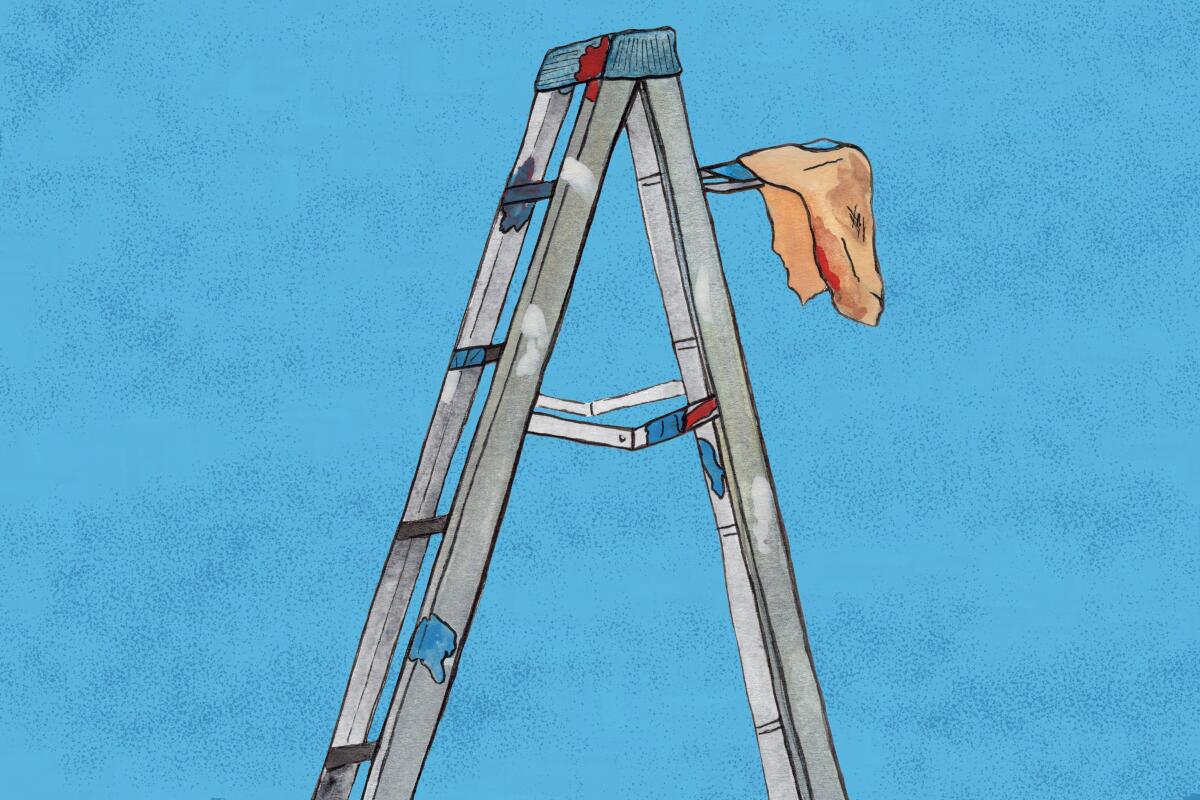Op-Ed: There were some things even my dad, the fixer, couldn’t fix

If ladders could talk, and if I knew how to listen to ladders, I would have learned more about being a father.
My dad didn’t teach me how to be a dad. He behaved like one and let me watch. Part of me is my mother; most of me is my dad. Mom was garrulous and temperamental. Dad was unflappable and patient. Mom sang in the car; Dad did not.
Mom told me how to live. Dad simply lived and let me watch. I watched him fix leaky faucets and broken lawnmowers, which I assumed were the official skills God granted only to dads. And — I remember this most of all — I watched him drag a ladder around the house searching for things to fix.
Arthur Chartrand was president of a small bank in 1960s Kansas, at a time when banks competed for checking and “passbook savings” accounts. There were no ATMs, no drive-through lanes. He kept his desk in the middle of the lobby, where he could see his employees, and customers could see Art Chartrand standing watch over their money. Sometimes they’d see one of his seven kids scampering around the carpet after school, begging Bazooka bubble gum off the loan officers.
My father loved banking, but he loved his ladder more. In the evenings, he swapped his suit for a stained T-shirt and a stubby cigar. He entered the garage and dragged out an ancient, paint-smeared aluminum ladder that once belonged to his father.
“Take care of the things you own,” he told me, “and they’ll last a long time.”
Our house was clad in wood shingles on all four sides, which kept us on ladders all summer, replacing old paint with new. Superficial sandpaper scrubbing was unacceptable. My dad taught us to use handheld blowtorches. You point the torch at every visible paint crack. If done properly, this heats up the old paint so that you can easily strip it with a hand scraper. If not done properly, you wind up with a horrifying amount of fire damage.
One summer afternoon, we paused torching and scraping to gather inside for Sunday lunch. Heads were bowed. Just after dad said, “Dear Lord ...,” my mother noticed the neighbors running across our lawn. They were pointing at the side of our house, the side I had been scraping. Flames darted from the shingles near my ladder. It was scary, but I have doubts that it warranted three firetrucks and two ambulances, sirens shrieking. Thankfully, our town had no SWAT team.
The fire was extinguished; Sunday lunch resumed. Examining the fire damage, my dad seemed more worried than angry. “Be more careful next time,” he said. “We can replace shingles, but we can’t replace you.”
I think my mom worried too much about worst outcomes: how her children would turn out and whether we’d be happy. Dad had a less tortured approach: Don’t worry, let kids be kids, and everybody will be happier. He did not learn that from “Sesame Street.”
This is not to suggest that men who are handy with ladders and tools are better fathers than those who are not. But the business of fixing, beyond home repairs, is a job requirement of fathers, mothers and bankers.
One day in the mid-1980s, Dad arrived at work to find a memo on his typewriter. It was from Mr. Big Bucks, the bank owner, announcing that he was turning the bank over to his sons. My dad could stay around, but he should stay out of the way. His desk would no longer be in the lobby. The memo was neatly typed on bank letterhead, with most of the words correctly spelled.
My dad cleared his desk without a fight. The Baby Bucks did not want passbook savings accounts or Bazooka bubble gum. They loved the fast lane and a rapidly emerging banking strategy known as “Use Bad Appraisals to Make Bad Loans and Hope Nothing Goes Wrong.” I have nothing else to say about it except that the bankers of the 1980s got what they deserved. They broke things they couldn’t fix.
Dad came home and showed the Bucks memo to Mom. He told her he loved her very much, but he didn’t love banking so much anymore. He sought other bank jobs, but no one wanted a fixer who might see what was broken. Or one whose son was a known fire risk.
My father passed away in 2004, after multiple bypass surgeries; the ignominy, to him, of living on Social Security; and a gathering depression in his old age. There are some things even a fixer can’t fix. He taught me that a father’s life isn’t measured by his achievements but by the lives he inspires … just by being a father. We buried my dad on Father’s Day weekend.
David Chartrand is a writer living in Olathe, Kan. @DavidVChartrand
More to Read
A cure for the common opinion
Get thought-provoking perspectives with our weekly newsletter.
You may occasionally receive promotional content from the Los Angeles Times.










